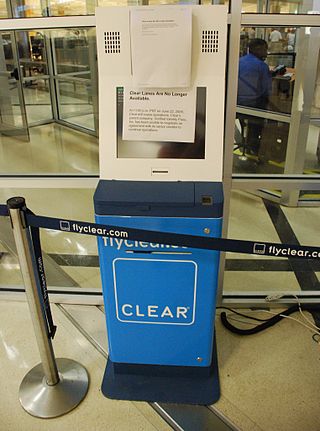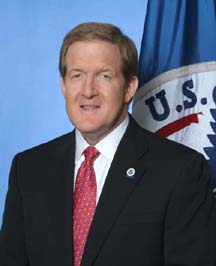After the September 11 attacks, there was an immediate call to action regarding the state of aviation security measures as the hijackers involved in 9/11 were able to successfully pass through security and take command of the plane. The existing security measures flagged more than half of the 19 hijackers in 9/11; however, they were cleared to board the plane because their bags were not found to contain any explosives. In the months and years following September 11, 2001, security at many airports worldwide were reformed to deter similar terrorist plots.

The Transportation Security Administration (TSA) is an agency of the United States Department of Homeland Security (DHS) that has authority over the security of transportation systems within, and connecting to, the United States. It was created as a response to the September 11 attacks to improve airport security procedures and consolidate air travel security under a combined federal law enforcement and regulatory agency.

Daniel K. Inouye International Airport, also known as Honolulu International Airport, is the main and largest airport in Hawaii. The airport is named after Honolulu native and Medal of Honor recipient Daniel Inouye, who represented Hawaii in the United States Senate from 1963 until his death in 2012. The airport is in the Honolulu census-designated place 3 miles (5 km) northwest of Honolulu's central business district. The airport covers 4,220 acres, more than 1% of Oahu's land.

Airport security includes the techniques and methods used in an attempt to protect passengers, staff, aircraft, and airport property from malicious harm, crime, terrorism, and other threats.

Kansas City International Airport is a public airport in Kansas City, Missouri, located 15 miles (24 km) northwest of Downtown Kansas City in Platte County, Missouri. The airport was opened in 1972 and a new complex in the airport was completed in 2023, replacing the old one. MCI replaced Kansas City Municipal Airport (MKC) in 1972, with all scheduled passenger airline flights moved from MKC to MCI. It serves the Kansas City Metropolitan Area and is the primary passenger airport for much of western Missouri and eastern Kansas.
The Computer-Assisted Passenger Prescreening System (CAPPS) is a counter-terrorism system in place in the United States air travel industry that matches passenger information with other data sources. The United States Transportation Security Administration (TSA) maintains a watchlist, pursuant to 49 USC § 114 (h)(2), of "individuals known to pose, or suspected of posing, a risk of air piracy or terrorism or a threat to airline or passenger safety." The list is used to pre-emptively identify terrorists attempting to buy airline tickets or board aircraft traveling in the United States, and to mitigate perceived threats.

A registered traveler is a person qualified through an airline passenger security assessment system in the United States air travel industry. Such programs were initially tested in 2005. Registered traveler programs are currently in operation in various airports around the country and are administered by TTAC, the Transportation Security Administration (TSA) office responsible for Secure Flight, the replacement for the Computer Assisted Passenger Prescreening System (CAPPS) and the canceled CAPPS II counter-terrorism system.

The Federal Air Marshal Service (FAMS) is a United States federal law enforcement agency under the supervision of the Transportation Security Administration (TSA) of the United States Department of Homeland Security (DHS).

Backscatter X-ray is an advanced X-ray imaging technology. Traditional X-ray machines detect hard and soft materials by the variation in x-ray intensity transmitted through the target. In contrast, backscatter X-ray detects the radiation that reflects from the target. It has potential applications where less-destructive examination is required, and can operate even if only one side of the target is available for examination.
Security theater is the practice of implementing security measures that are considered to provide the feeling of improved security while doing little or nothing to achieve it.

Sioux Falls Regional Airport, also known as Joe Foss Field, is a public and military use airport three miles northwest of Sioux Falls, South Dakota, United States. It is named in honor of aviator and Sioux Falls native Joe Foss, who later served as the 20th Governor of South Dakota (1955–1959).
The CTX is an explosive detection device, a family of x-ray devices developed by InVision Technologies in 1990 that uses CAT scans and sophisticated image processing software to automatically screen checked baggage for explosives.

Edmund Summers "Kip" Hawley III was an American government official and business executive who was administrator of the Transportation Security Administration, part of United States government's Department of Homeland Security, from July 27, 2005, to January 20, 2009. He replaced the previous Director, Rear Admiral David Stone. He was succeeded by Acting Administrator Gale Rossides.

A full-body scanner is a device that detects objects on or inside a person's body for security screening purposes, without physically removing clothes or making physical contact. Unlike metal detectors, full-body scanners can detect non-metal objects, which became an increasing concern after various airliner bombing attempts in the 2000s. Some scanners can also detect swallowed items or items hidden in the body cavities of a person. Starting in 2007, full-body scanners started supplementing metal detectors at airports and train stations in many countries.

A millimeter wave scanner is a whole-body imaging device used for detecting objects concealed underneath a person’s clothing using a form of electromagnetic radiation. Typical uses for this technology include detection of items for commercial loss prevention, smuggling, and screening for weapons at government buildings and airport security checkpoints.
In the United States, border security includes the protection of ports, airports, and the country's 3,017-mile (4,855 km) land border with Canada and 1,933-mile (3,111 km) border with Mexico. The U.S. concept of border security is deeply entwined with the persistent actual or perceived threat of terrorism, as well as more universal concerns such as immigration control, smuggling, and human trafficking. As such, the U.S. federal government is constantly reevaluating and adjusting its border security policies to reflect the perceived threats posed to the United States.

A Visible Intermodal Prevention and Response team, sometimes Visible Intermodal Protection and Response (VIPR) is a Transportation Security Administration program. Various government sources have differing descriptions of VIPR's exact mission. It is specifically authorized by 6 U.S.C. § 1112 which says that the program is to "augment the security of any mode of transportation at any location within the United States". Authority for the program is under the Secretary of Homeland Security. The program falls under TSA's Office of Law Enforcement/Federal Air Marshal Service. TSA OLE/FAMS shares responsibility for the program with the Office of Security Operations and Transportation Sector Network Management.
On November 1, 2013, a terrorist attack occurred at around 9:20 a.m. PDT in Terminal 3 of the Los Angeles International Airport. 23-year-old Paul Anthony Ciancia opened fire with a rifle, killing a Transportation Security Administration officer and injuring several other people.
Clear Secure, Inc. is an American technology company that operates biometric travel document verification systems at some major airports and stadiums.
The Screening Partnership Program (SPP), instituted in 2004 by the Transportation Security Administration (TSA) in the United States, is a program that allows airports to employ private security agencies to conduct screening, instead of having the TSA conduct said screenings. Airports and security agencies must complete applications in order to be eligible to participate in this program. All private security agencies must follow all TSA screening policies and procedures, and use TSA-approved equipment.










